
Memetic Computing
Scope & Guideline
Pioneering Research at the Intersection of Control and Optimization
Introduction
Aims and Scopes
- Evolutionary Algorithms and Optimization Techniques:
The journal emphasizes the development and application of evolutionary algorithms, including genetic algorithms, memetic algorithms, and hybrid approaches, to solve complex optimization problems. - Multi-Objective Optimization:
A core focus is on multi-objective optimization, where solutions must satisfy multiple criteria, reflecting real-world complexities in fields such as engineering, logistics, and finance. - Applications in Various Domains:
Research published in the journal spans diverse fields, including bioinformatics, robotics, telecommunications, and resource management, showcasing the versatility of memetic computing approaches. - Integration with Machine Learning:
The journal explores the integration of evolutionary strategies with machine learning techniques, particularly in enhancing learning algorithms and improving decision-making processes. - Dynamic and Adaptive Systems:
There is a consistent interest in dynamic optimization problems where environments change over time, requiring algorithms that can adapt and respond effectively.
Trending and Emerging
- Deep Reinforcement Learning Integration:
There is a rising trend in integrating deep reinforcement learning with evolutionary strategies, indicating a growing interest in leveraging the strengths of both fields to tackle complex decision-making problems. - Adaptive and Self-Adjusting Algorithms:
Emerging research focuses on the development of algorithms that can adapt their parameters and strategies in real-time, which is crucial for applications in dynamic environments. - Graph-Based Learning Techniques:
The use of graph structures in optimization problems is gaining traction, particularly in applications related to network routing, data representation, and complex systems modeling. - Surrogate-Assisted Optimization:
Surrogate models are increasingly being utilized to enhance the efficiency of optimization processes, especially in scenarios where evaluations are costly or time-consuming. - Emotion-Aware and Bio-Inspired Algorithms:
Emerging themes include bio-inspired algorithms that incorporate emotional and cognitive elements, reflecting a trend towards more human-like decision-making processes in computational models.
Declining or Waning
- Traditional Genetic Algorithms:
There appears to be a waning interest in traditional genetic algorithms as standalone techniques, with a shift towards more hybrid and adaptive approaches that incorporate other methodologies. - Static Optimization Problems:
Research addressing static optimization problems is becoming less prominent, likely due to the growing complexity of real-world applications that require dynamic and adaptable solutions. - Single-Objective Optimization:
The focus on single-objective optimization scenarios is declining as researchers increasingly recognize the necessity of considering multiple objectives and constraints in practical applications. - Basic Heuristic Techniques:
Basic heuristic techniques are less frequently explored, as the field moves towards more sophisticated and integrated approaches that combine heuristics with machine learning and other advanced methods.
Similar Journals
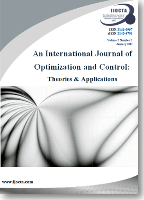
International Journal of Optimization and Control-Theories & Applications-IJOCTA
Bridging Theory and Practice for Optimal Solutions.International Journal of Optimization and Control-Theories & Applications (IJOCTA), published by Ramazan Yaman, stands as a pivotal platform in the fields of applied mathematics and control optimization. With an ISSN of 2146-0957 and an E-ISSN of 2146-5703, IJOCTA has embraced an Open Access model since 2011, ensuring that its scholarly contributions are widely accessible to researchers, professionals, and students alike. Based in Turkey at the Istanbul Atlas University, the journal is committed to advancing the scope of optimization and control theories, featuring comprehensive studies that bridge theoretical foundations with practical applications. Despite its relatively recent surge, IJOCTA has achieved impressive standings, including a Q3 quartile ranking in both Applied Mathematics and Control and Optimization for 2023, alongside commendable Scopus rankings (Rank #192 in Applied Mathematics and Rank #44 in Control and Optimization). These metrics underscore the journal’s growing significance and impact within the global research community, making it an invaluable resource for those seeking to explore contemporary developments in optimization and control.
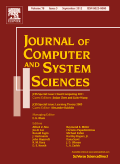
JOURNAL OF COMPUTER AND SYSTEM SCIENCES
Fostering excellence in theoretical and practical computer science.The Journal of Computer and System Sciences is a distinguished publication founded in 1967 and continually striving to push the boundaries of knowledge in computer science and applied mathematics. Published by Academic Press Inc, Elsevier Science, this journal boasts impressive credentials, holding a Q1 quartile ranking across multiple categories including Applied Mathematics, Computational Theory and Mathematics, Computer Networks and Communications, and Theoretical Computer Science as of 2023. With a focus on innovative research and comprehensive theoretical developments, this journal serves as a pivotal forum for authors and readers alike, facilitating cutting-edge contributions to the field. The journal is not currently open access, providing a curated selection of high-quality articles for its subscription residents. By engaging with this journal, researchers, professionals, and students can gain insight into the latest trends, prominent methodologies, and significant findings that shape the modern landscape of computing and systems analysis.
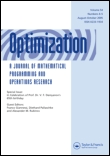
OPTIMIZATION
Elevating knowledge in control and optimization for real-world impact.OPTIMIZATION is a distinguished scholarly journal published by TAYLOR & FRANCIS LTD, catering to the vibrant fields of Applied Mathematics, Control and Optimization, and Management Science and Operations Research. With an ISSN of 0233-1934 and an E-ISSN of 1029-4945, this journal serves as a crucial platform for researchers, practitioners, and students alike, presenting cutting-edge research and innovative methodologies since its inception in 1985. With its current standing in the Q2 category across multiple fields as of 2023, OPTIMIZATION underscores its impact and relevance in the academic community, attracting high-quality contributions and fostering knowledge dissemination. Though it operates under a traditional access model, the journal ensures that its rigorous peer-reviewed content remains accessible to a wide audience, reflecting the latest advancements in optimization techniques and their applications in real-world scenarios. Whether you’re looking to deepen your understanding of optimization principles or apply these insights within your own research, OPTIMIZATION is an essential resource for advancing your knowledge and expertise in this dynamic field.

SOFT COMPUTING
Pioneering Innovations in Computational IntelligenceSOFT COMPUTING is a premier international journal published by Springer, focusing on the interdisciplinary field of soft computing, which includes areas such as fuzzy logic, neural networks, genetic algorithms, and their applications. With an ISSN of 1432-7643 and E-ISSN 1433-7479, the journal is based in Germany and contributes significantly to the advancement of knowledge in its fields, boasting an impressive Scopus ranking that places it in the top echelons of Geometry and Topology, Theoretical Computer Science, and Software categories. In the 2023 category quartiles, it has achieved Q2 rankings in multiple disciplines, reflecting its high-quality research contributions. Though not Open Access, the journal's rigor and relevance to contemporary issues make it a favored resource for researchers, professionals, and students alike. From its inception in 2000 and spanning across the years until 2024, SOFT COMPUTING continues to serve as a robust platform for innovative research and theoretical advancements, making it an essential read for anyone engaged in the rapidly evolving landscape of computational intelligence.

EURO Journal on Computational Optimization
Advancing the Frontiers of Computational OptimizationEURO Journal on Computational Optimization, published by ELSEVIER, is a leading open-access journal that has been advancing the field of computational optimization since its inception in 2013. Catering to a diverse audience of researchers, professionals, and students, this journal addresses critical developments in computational mathematics, control and optimization, and management science. With an impressive Q1 category ranking in multiple areas, including Computational Mathematics and Management Science and Operations Research, the journal serves as a pivotal platform for disseminating groundbreaking research and innovative methodologies. Its commitment to open access ensures that valuable insights are readily available to the global academic community. With a continuous publication timeline through 2024, the EURO Journal on Computational Optimization is positioned at the forefront of its field, fostering collaboration and innovation in optimization techniques and applications.

Natural Computing
Advancing Knowledge in Nature-Inspired AlgorithmsNatural Computing is a leading peer-reviewed journal published by Springer, focusing on the interdisciplinary study of natural computation methods and their applications across various domains. With an ISSN of 1567-7818 and an E-ISSN of 1572-9796, this journal has established itself as vital in the field of Computer Science Applications, as reflected in its esteemed Q2 quartile ranking and a Scopus rank of #358 among 817 journals, placing it in the 56th percentile. Based in the Netherlands, Natural Computing covers a diverse range of topics, including computational models inspired by natural systems, evolutionary algorithms, and swarm intelligence. Seeking to bridge the gap between theoretical research and practical applications, this journal serves researchers, professionals, and students by providing insights and advancements in the field. With a commitment to fostering innovation, Natural Computing aims to push the boundaries of understanding in computational methods inspired by nature, making it an essential resource for those looking to contribute to and stay updated within this dynamic area.
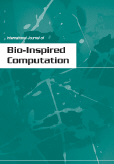
International Journal of Bio-Inspired Computation
Harnessing Nature's Strategies for Intelligent SolutionsInternational Journal of Bio-Inspired Computation, published by INDERSCIENCE ENTERPRISES LTD, is a leading platform dedicated to advancing research in the fields of bio-inspired computing and its applications. With a robust ISSN of 1758-0366 and E-ISSN of 1758-0374, this journal contributes significantly to the discourse in Computer Science, particularly emphasizing theoretical and practical frameworks that mirror natural processes. Situated in Switzerland, this peer-reviewed journal operates under a rigorous editorial process, ensuring high-quality publications that attract considerable attention, as evidenced by its placement in the Q2 category for 2023 in General Computer Science and Q3 in Theoretical Computer Science. With Scopus rankings reflecting its growing influence—ranked #62 out of 232 in General Computer Science and #36 out of 130 in Theoretical Computer Science—this journal invites researchers, professionals, and students to explore innovative methodologies and development in bio-inspired technologies. Although it currently does not adopt an open-access model, the journal remains committed to disseminating vital research that fuels advancements in computational intelligence, fostering collaboration and knowledge exchange in the ever-evolving landscape of computing.

Optimization Letters
Fostering Excellence in Optimization Research and ApplicationsOptimization Letters, published by SPRINGER HEIDELBERG, is a leading journal dedicated to the field of optimization, serving as a platform for high-quality research that spans across mathematics, control, and management disciplines. Based in Germany, this journal has been pivotal in advancing the theory and applications of optimization since its inception in 2007, converging a wide scope of innovative methodologies and practical applications up until 2024. With an impressive Scopus ranking placing it in the Q2 category for both Business, Management and Accounting (miscellaneous) and Control and Optimization, it reflects the journal's commitment to disseminating impactful research. Researchers and practitioners benefit from the journal’s rigorous peer-review process, enhancing its credibility within the academic community. Optimization Letters invites contributions that encapsulate novel findings and methodologies that drive forward the understanding and applications of optimization, making it an invaluable resource for those in related fields.
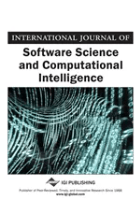
International Journal of Software Science and Computational Intelligence-IJSSCI
Elevating Academic Discourse in Software and AIInternational Journal of Software Science and Computational Intelligence (IJSSCI) is a prominent academic journal published by IGI Global, dedicated to advancing the fields of software science and computational intelligence. With its ISSN 1942-9045 and E-ISSN 1942-9037, IJSSCI offers a platform for researchers, practitioners, and students to disseminate innovative research findings, theoretical advancements, and practical applications in areas such as algorithm development, machine learning, and software engineering. Although the journal currently does not operate under an open access model, its rigorous peer-review process ensures high-quality publications that contribute significantly to the academic discourse. Based in Hershey, PA, IJSSCI is recognized for its commitment to fostering collaboration among professionals in the technology and computer science fields, making it an essential resource for those looking to stay at the forefront of software science advancements.
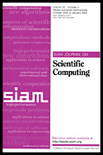
SIAM JOURNAL ON SCIENTIFIC COMPUTING
Transforming Scientific Challenges into Computational SolutionsSIAM Journal on Scientific Computing is a premier journal published by SIAM Publications, focusing on the interdisciplinary domain of scientific computing. With a significant standing in the academic community, this journal boasts a 2023 Q1 ranking in both Applied Mathematics and Computational Mathematics, positioning it among the top-tier publications in these fields. The journal aims to disseminate high-quality research that applies computational methods to solve scientific and engineering problems, fostering advancements in numerical analysis, algorithms, and software development. Researchers and professionals can greatly benefit from the journal's rigorous peer-review process and its reputation for publishing cutting-edge studies. Though it is not an open-access journal, subscribing institutions and individual subscribers gain access to a wealth of knowledge tailored for those seeking to enhance their expertise in scientific computation. With its established history since 1996 and continuing to publish until 2024, the SIAM Journal on Scientific Computing remains an essential resource for students, researchers, and professionals dedicated to pushing the boundaries of this dynamic field.